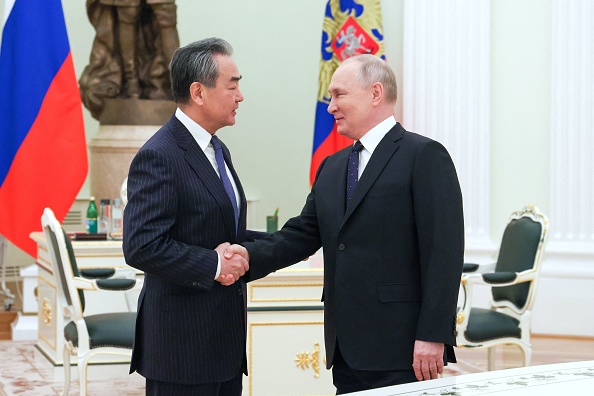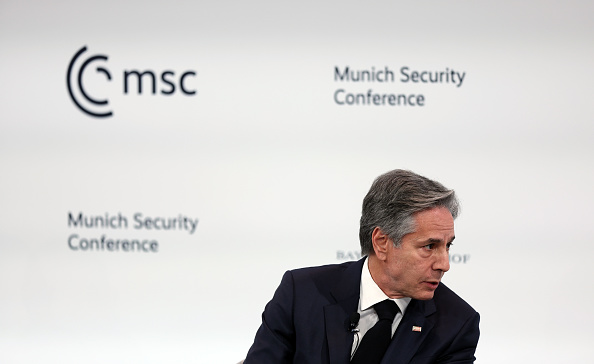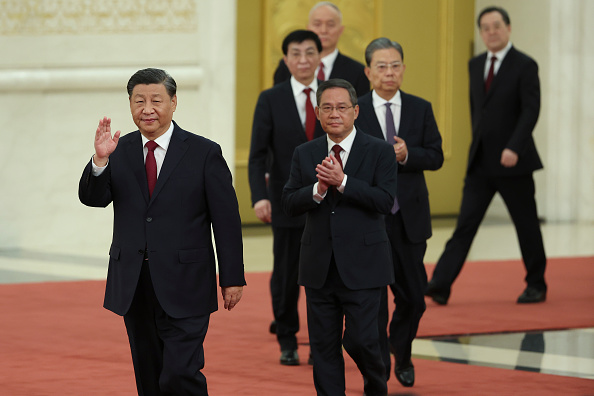
 Opposing Worldviews
Opposing WorldviewsAs the war in Ukraine marks its one year anniversary today, China called for a ceasefire and peace talks between Russia and Ukraine. In a 12-point plan published Friday, that was largely in line with previous statements the country has made about the conflict, China's foreign ministry said: "All parties should support Russia and Ukraine in working in the same direction and resuming direct dialogue as quickly as possible, so as to gradually deescalate the situation and ultimately reach a comprehensive ceasefire."
The week leading up to the anniversary was symbolically underscored by visits from China's top diplomat to Moscow and the United States' President to Kyiv. The optics of the two trips highlight the differing worldviews held by the world's two superpowers.
While Wang Yi met in Moscow with Russian President Vladimir Putin; President Biden visited both Ukraine and neighboring Poland where he reiterated America's commitment to NATO. Biden urged world leaders to recommit to a unified defense of Ukraine, saying global democracy is at stake and accusing Russia of committing crimes against humanity through its "abhorrent" acts against civilians.
The U.S. and its global allies worry that Beijing may start providing weapons to Russia, which would risk a potential escalation of the Ukraine war into a confrontation between Russia and China on the one side and Ukraine and the U.S.-led NATO military alliance on the other.
And as the U.S. and its allies reaffirm their support with pledges of new military aid for Ukraine worth $500 million, Beijing's deepening partnership with Moscow has raised alarms. Secretary of State Anthony Blinken warned of "serious consequences" if Beijing provides lethal aid to Moscow.
 Munich Meetings
Munich MeetingsThe U.S. Secretary of State Antony Blinken met with China's top diplomat Wang Yi at the Munich Security Conference in a face-to-face meeting postponed after the U.S. military shot down an alleged Chinese spy balloon off the coast of South Carolina. Blinken told his counterpart that Beijing's surveillance program had been "exposed to the world."
According to the meeting readout from the U.S. side, Blinken "directly spoke to the unacceptable violation of U.S. sovereignty and international law" and said incidents like the balloon, which soared over U.S. airspace for days before fighter jets shot it down, "must never occur again."
Blinken also discussed other ongoing affairs with Wang, including warning of consequences if China supports Russia in its ongoing war with Ukraine and condemning North Korea's firing of a missile into the sea of Japan.
Wang emphasized China's "solemn position" on the airship incident, and told Blinken that the U.S. should face up to and fix the damage inflicted on bilateral relations after the U.S. "abused its force" and shot down the balloon, according to a statement from the Chinese Foreign Ministry.
Analysts have noted that relations between the two nations are at the lowest point in decades, and Saturday's meeting didn't do much to improve the situation.
At the conference, Wang addressed a room of European officials as "dear friends" and touted China's commitment to peace, while also discussing the differences between Europe and the U.S.
Read more in "U.S.-China Relations at a Tipping Point," by David Shambaugh, a Gaston Sigur Professor of Asian Studies and Director of the China Policy Program at George Washington University.
 Economic Shakeup
Economic ShakeupChina's top leaders are gearing up for the annual 'Two Sessions' gathering, which will convene in early March. The line-ups for key government, legislative, and political advisory positions are finalized and will be formally endorsed by the national legislature at the session. Senior leaders have also agreed to consider further restructuring of party and state bodies.
Additionally, it's anticipated that Chinese leader Xi Jinping is preparing to shake up the leadership of the country's financial system, and that he will install key associates to run the central bank and tighten political control over financial affairs.
These moves would be a continuation of efforts by Xi to reshape China's economy, according to experts, while simultaneously supporting the country's continuing efforts to recover from the economic impacts of COVID-19.
While signs of employment opportunities, like job fairs, are making a comeback in person for the first time in three years, and there's discussion of stimulus for graduates and home buyers, experts have noted that subdued wages and less abundant offerings in some sectors point to an uneven and guarded recovery.
There's also concern that China's swift reopening might stoke global inflation. While there's hope that it will continue to boost global economic growth, it could also threaten to push up global prices for fuel, industrial metals, and food.
With this, analysts have noted that the Two Sessions is a good time to signal economic support for the country.
Read more in "China's Economic Rebound," by He Weiwen, a Senior Fellow at the Center for China and Globalization.
Prepared by China-US Focus editorial teams in Hong Kong and New York, this weekly newsletter offers you snap shots of latest trends and developments emerging from China every week, while adding a dose of historical perspective.
- 2023-02-17 Ripple Effects
- 2023-02-10 Ballooning Tensions
- 2023-02-03 Hot Air
- 2023-01-27 Spheres of Influence
- 2023-01-20 China's Davos Pitch
- 2023-01-13 Strategic Encounters
- 2023-01-06 Common Challenges
- 2022-12-23
- 2022-12-16 All in On Africa
- 2022-12-09 Seeking Stabilization
- 2022-12-02 Turf Tension
- 2022-11-18 Thawing Ties?
- 2022-11-11 Face to Face
- 2022-11-04 The Pacing Challenge
- 2022-10-28 Third Time’s the Charm
- 2022-10-21 United as Steel
- 2022-10-14 Party Time
- 2022-10-07 Elections Incoming
- 2022-09-30 Hot Intrigue
